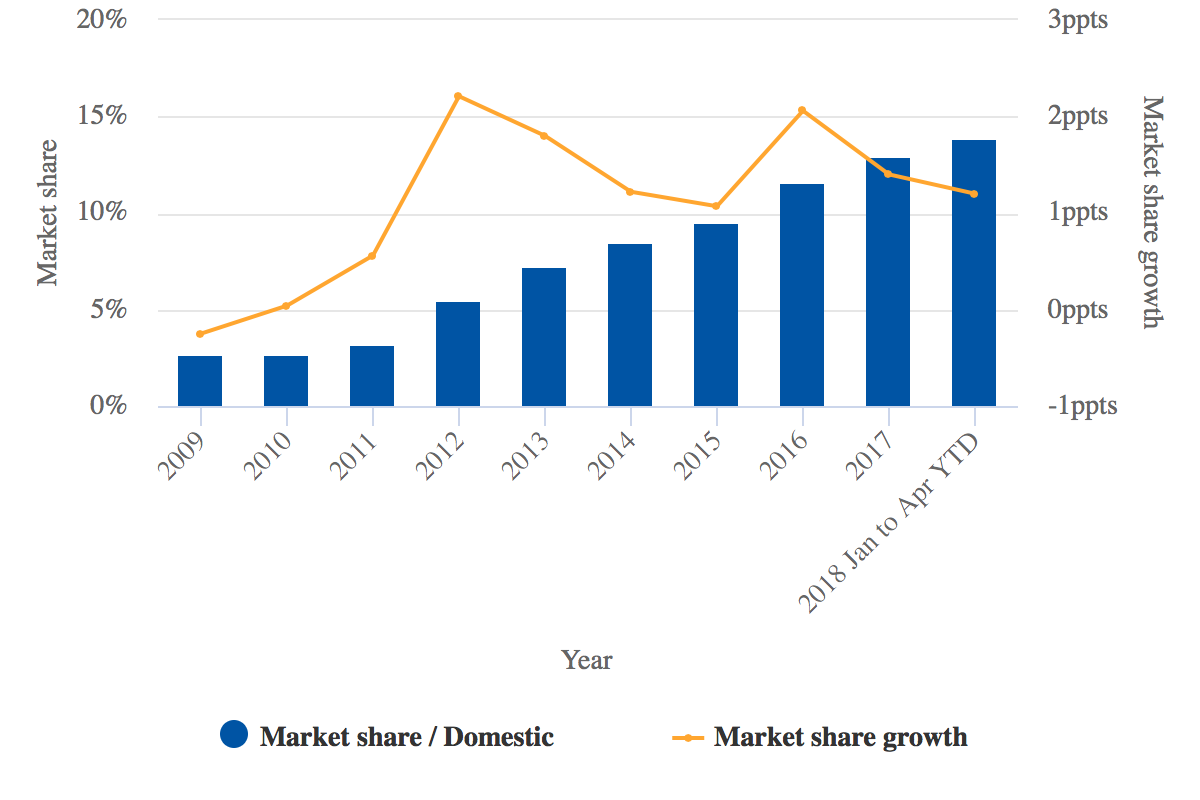Summary:
- Avianca Brazil has grown its domestic market share from less than 3% in 2009 to 14% in 2018;
- The airline has grown domestic capacity at a double-digit clip for eight consecutive years and expects domestic ASK growth of another 20% in 2018;
- It launched widebody operations in 2017 with three new international routes; capacity on two of these routes will be added in 2H2018;
- Avianca Brazil will wait until after the October general elections in Brazil to decide on further international expansion
Avianca Brazil's domestic ASKs have increased seven-fold since 2009. ASKs were up +15% in 2017, marking the eighth consecutive year of double digit growth. Domestic ASKs increased another +14% in the first four months of 2018 and the airline expects to end the year with approximately 20% domestic capacity growth.
It flew 13% of total domestic RPKs in 2017 and its domestic market share reached almost 14% in the first four months of 2018, according to Brazil ANAC data. While it is still smaller than Gol, LATAM Brazil (previously known as TAM Airlines) and Azul Airlines, Avianca Brazil is now a significant player in one of the world's largest domestic markets.
CHART - Avianca Brazil has boosted its share of the domestic market since 2009 hitting a new high over the first four months of 2018 Source: CAPA - Centre for Aviation & Brazil ANAC
Source: CAPA - Centre for Aviation & Brazil ANAC
Avianca Brazil chairman Jose Efromovich credits the airline's success to offering a differentiated product. It offers meals on domestic flights, provides inflight entertainment and has the most generous seat pitch in the Brazilian market. Mr Efromovich said in a CAPA TV interview earlier this month that Synergy decided in 2008 that the airline needed "to do something different" in order to "compete with two giants" which at the time controlled over 90% of the market.
"We differentiated our product and today we are in a position to be able to offer more," he said. "We have people that love to fly with us and on some of the flights (from other airlines) they don't have the space," he explained.
Mr Efromovich served as Avianca Brazil's CEO from 2008 to 2016 and continues to play an active role as chairman and co-owner of parent Synergy. He believes Avianca Brazil's product is particularly attractive to corporates. Over the years business passengers has accounted for about 50% of Avianca Brazil's traffic - although a bit less in recent times due to the economic recession in Brazil.
While Avianca Brazil does not have a business class on its narrowbody fleet, Mr Efromovich said Brazilians are used to travelling economy when flying domestically and offering the most generous economy pitch has attracted business passengers. For example, Avianca Brazil's A320ceos have 162 seats compared to the normal 180 all economy configuration.
The company introduced a business class product in 2017 on its A330 fleet. However, the new fleet of four A330s are only used on three international routes. Avianca Brazil launched a daily service from Sao Paulo to Miami in Jun-2017, its first long haul route. It later added two daily flights from Sao Paulo to Santiago in Aug-2017 and one daily flight from Sao Paulo to New York JFK in Dec-2017.
Prior to mid 2017, Avianca Brazil's only international flight had been a once weekly A319 service from Fortaleza to Bogota. It also started operating once weekly A319 flights from Recife and Salvador to Bogota in 2H2017. It accounted for just 2.6% total Brazilian airline international RPKs in 2017, according to ANAC data. But over the first four months of 2018 its international market share has grown to 5.9%.
Avianca Brazil recently announced plans to add a third daily flight to Santiago in Aug-2018 and a second daily flight to Miami in Nov-2018. Mr Efromovich revealed that Avianca Brazil is planning to add two A330s to support the additional international flights. Santiago will continue to be served with a mix of one-class A320s and two-class A330s while all the US flights are operated with A330s.
A decision on further international and widebody expansion will be made at the end of this year with Mr Efromovich noting the airline does not want to make any major business decisions in the current uncertain political environment. Brazil is holding general elections in Oct-2018.
Avianca Brazil is also waiting until after the elections to determine an expansion rate for domestic capacity and its narrowbody fleet. Mr Efromovich said Avianca Brazil plans to end 2018 with a fleet of 58 A320 narrowbody aircraft. It has 62 A320neos on order along with 10 A350-900s, according to the CAPA - Centre for Aviation Fleet Database. The A320neo order was placed in 2016 while the A350 order dates back to 2008 and has since been delayed several times.
Mr Efromovich said the A350s "are still on order and they are still in the plan. We just wanted to know when exactly and to where exactly … We have several options and many alternatives, but no decision has been made yet."
WATCH our exclusive CAPA TV video interview with Jose Efromovich for the CAPA - Centre for Aviation Airline CEOs in Sydney forum earlier this month...